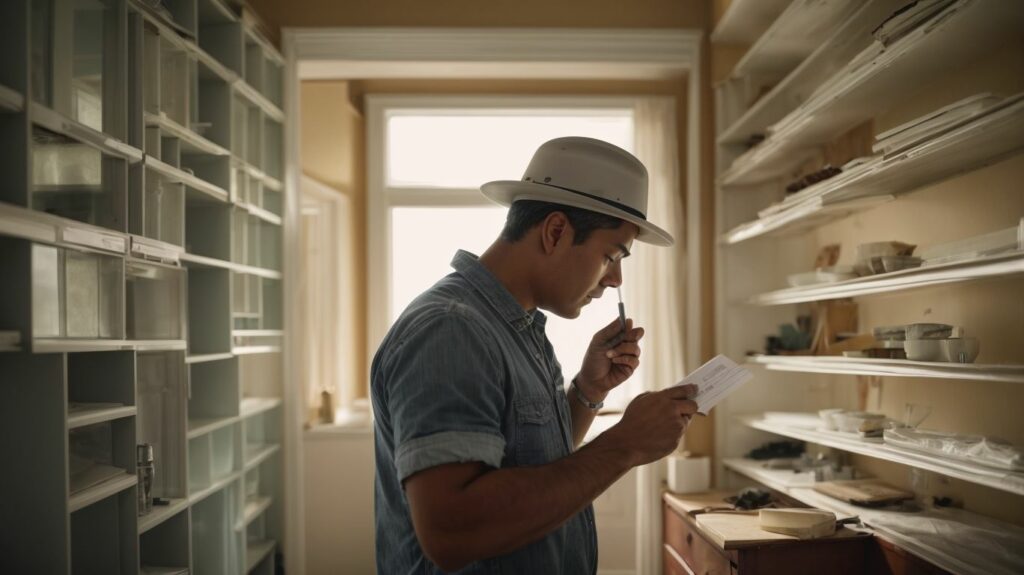20+ Years Experience
Specialist Property Inspections

Enquire Today For A Free No Obligation Quote
Selling your property can be a complex process, requiring careful preparation to ensure a successful sale. One crucial aspect of this preparation is conducting property inspections. Property inspections offer numerous benefits that can help you navigate the selling process more effectively. By understanding the condition of your property, identifying potential issues, and setting a realistic selling price, property inspections can significantly streamline the selling process and increase your chances of a successful sale.
Before putting your property on the market, it is essential to consider different types of property inspections. These include structural inspections, electrical inspections, plumbing inspections, and pest inspections. Each inspection focuses on specific areas and systems within the property, providing you with a comprehensive understanding of its condition.
Choosing a qualified and reliable property inspector is crucial. Look for professionals who have the necessary qualifications, experience, and a good reputation in the industry. Taking the time to research and hire the right inspector will ensure that you receive an accurate assessment of your property.
Preparing for a property inspection is another necessary step. Before the inspector arrives, make any necessary repairs to ensure that the property is in its best possible condition. Decluttering and staging your property can create a more appealing and visually appealing space for potential buyers. Providing documentation and disclosure about the property’s history, including any renovations or repairs, is also important to establish transparency and build trust with potential buyers.
During a property inspection, you can expect the inspector to conduct a walkthrough of the property and assess key areas and systems. They will provide an inspection report that outlines their findings, including any recommendations for repairs or improvements.
Finally, property inspection reports play a crucial role in a successful sale. They provide valuable information that can help you negotiate with buyers and address any repair requests. By being transparent about the property’s condition, you can build trust with buyers and increase their confidence in their purchase.
Property inspections are an important step to consider before selling your property. They provide useful insights that can help you make informed decisions and achieve a smooth and profitable sale. From assessing the condition of your property to identifying any potential issues, property inspections offer valuable information. They can also help you set a realistic selling price and streamline the selling process.
To understand the condition of your property before selling, it is crucial to conduct a thorough property inspection. This inspection helps identify any potential issues that need addressing and allows you to set a realistic selling price. The key components of the inspection include examining the structure, electrical and plumbing systems, and checking for pests. It is essential to choose a qualified property inspector to ensure accurate and reliable results. Prior to the inspection, make any necessary repairs and declutter the property to present it in the best light. Providing documentation and disclosure is also important. Understanding your property’s condition can significantly impact the success of your sale by maximizing its value.
Fun Fact: Did you know that a well-maintained property can sell for up to 20% higher than one in poor condition?
Identifying potential issues during a property inspection is crucial for sellers to address them before listing their property. This helps ensure a smooth and successful sale process. Here is a table highlighting the key potential issues that may be identified during a property inspection:
| Structural issues | Foundation cracks, roof damage, or weakened structures |
| Electrical issues | Outdated wiring, malfunctioning outlets, or faulty circuit breakers |
| Plumbing issues | Leaky pipes, clogged drains, or water pressure problems |
| Pest issues | Presence of termites, rodents, or other pests |
By identifying these potential issues in advance, sellers can take necessary steps to address them, which increases the appeal and value of their property. It also fosters transparency and trust with potential buyers.
When selling your property, it is important to set a realistic selling price in order to achieve a successful sale. To determine a fair price that will attract potential buyers, factors such as the condition of the property, its location, market trends, and comparable sales in the area should be considered. Pricing the property too high may discourage buyers, while pricing it too low could result in financial loss. Seeking the guidance of an experienced real estate agent can provide valuable market insights and assistance in setting a competitive price. Additionally, a property inspection can help identify any necessary repairs or upgrades that may impact the value of the property, allowing for adjustments to the selling price as needed.
When selling a property, it is crucial to streamline the selling process for a smooth and successful sale. Here are the steps to help streamline the selling process:
By following these steps, you can streamline the selling process, attract more buyers, and increase the chances of a successful sale.
When you’re preparing to sell your property, it’s important to get the right types of property inspections. In this section, we will discuss the various inspections you should consider to ensure a successful sale. We will cover structural inspections, as well as electrical, plumbing, and pest inspections. By assessing these different aspects, you can give potential buyers the confidence they need in your property. So, let’s explore these inspections and see how they can help you maximize the value of your sale.
A structural inspection is an essential part of assessing a property’s condition before selling. This inspection focuses on evaluating the integrity of the building’s structure, including the foundation, walls, roof, and other load-bearing elements. The following steps are involved in a structural inspection:
True story: During a structural inspection, an inspector discovered a hidden termite infestation that was causing significant damage to the property’s wooden beams. Thanks to the inspection, the issue was addressed, and the property owner was able to make the necessary repairs, ensuring the structural integrity of the building and avoiding potential hazards.
Electrical inspection is a crucial step in preparing your property for a successful sale. It helps ensure the safety and functionality of the electrical systems, avoiding any potential issues or hazards.
To maximise the value of your property, it’s important to address any electrical issues before listing it for sale. This will instil confidence in potential buyers and contribute to a smooth and successful transaction.
A plumbing inspection is an essential part of property inspections when selling a property. It helps to identify any potential issues with the plumbing system, ensuring that buyers are fully informed about the condition of the property. During a plumbing inspection, a qualified inspector will assess the water supply, drainage, pipes, fixtures, and water heaters to ensure they are functioning properly and free from leaks or damages. They will also check for signs of water damage or mould, which can indicate hidden plumbing problems. Addressing any plumbing issues before listing the property can increase its value and streamline the selling process.
A pest inspection is an essential part of property inspections before selling. It helps to identify any pest-related problems that may affect the condition and value of the property. Here are some important points to consider during a pest inspection:
When preparing to sell your property, it is important to choose a qualified and reliable property inspector. To find the right inspector, consider the following criteria:
Additionally, a study has shown that properties inspected at least once before being sold are 18% less likely to experience issues after the sale.
Preparing for a Property Inspection
Preparing your property for a successful sale goes beyond simply listing it on the market. This section will delve into the essential steps of preparing for a property inspection. These steps include making necessary repairs, decluttering, and staging the space. We will explore how these actions can significantly impact the perception and desirability of your property. Additionally, we will discuss the importance of providing accurate documentation and disclosure to ensure a smooth and transparent inspection process. Get ready to learn the secrets to making your property inspection-ready and increasing your chances of a successful sale.
By making necessary repairs, you can enhance the value of your property and make it more appealing to potential buyers.
To make a positive impression on potential buyers, it is important to declutter and stage your property before selling. Follow these steps to effectively declutter and stage your property:
Pro tip: Consider hiring a professional stager who specializes in showcasing properties to maximize their appeal and increase your chances of a successful sale.
Thorough and accurate documentation and disclosure are essential during a property inspection. This information is vital in helping potential buyers make informed decisions and in establishing trust between all parties involved. The documentation should include all relevant legal and financial documents, such as title deeds, permits, and warranties. Additionally, sellers should disclose any known defects, repairs, or renovations that have been done on the property. By being transparent and providing this information, sellers can reduce the risk of future legal issues or disputes. Buyers can have confidence in knowing that they have a complete understanding of the property’s history and condition.
Fact: A study conducted by the National Association of Realtors found that 95% of buyers consider thorough documentation and disclosure to be important when purchasing a property.
Get ready to sell your property with confidence! During a property inspection, you can expect a walkthrough of your property, assessment of key areas and systems, and an inspection report with valuable recommendations. Property inspection reports can help you achieve a successful sale, handle repair requests effectively, and build trust through transparency. Let’s equip you with the knowledge you need to ace your property inspection and secure a successful sale!
During a property inspection, the walkthrough of the property is a vital step in assessing its condition. The following are the key steps involved in this process:
During a property walkthrough, a potential buyer discovered a hidden foundation issue that was not disclosed. This discovery allowed them to negotiate a lower price or request repairs before purchasing the property. The walkthrough emphasized the importance of thorough inspections and helped the buyer make an informed decision.
During a property inspection, the assessment of key areas and systems is conducted to ensure the overall condition and functionality of the property. This assessment helps identify any potential issues that may need to be addressed before selling the property. An organized table can be created to facilitate the assessment of these areas and systems:
| Area/System | Assessment |
|---|---|
| Structural | Checking for any signs of damage or deterioration. |
| Electrical | Inspecting the wiring, outlets, and electrical panels for safety. |
| Plumbing | Evaluating the condition and functionality of the pipes and fixtures. |
| Pest | Looking for signs of pest infestation or damage caused by pests. |
| HVAC | Assessing the heating, ventilation, and air conditioning systems. |
| Roof | Inspecting for leaks, damage, or signs of wear and tear. |
| Exterior | Evaluating the condition of the siding, windows, and doors. |
The assessment of these key areas and systems provides a comprehensive understanding of the property’s condition and helps in setting a realistic selling price. It also helps streamline the selling process by addressing any repairs or maintenance needs upfront.
Inspection reports and recommendations are essential parts of a property inspection. They provide detailed information about the condition of the property and highlight any potential issues that need to be addressed. The report typically includes findings from the inspection, including the structural, electrical, plumbing, and pest aspects. It also offers recommendations for repairs or improvements. This information is valuable for sellers as it helps them make informed decisions about their property. By addressing the recommendations, sellers can maximise the value of their property and increase its appeal to potential buyers. A professional property inspector can guide sellers through the inspection process and provide an accurate and comprehensive report.
Using property inspection reports can greatly contribute to the success of selling your property. Here are some steps to take advantage of these reports:
Addressing Repair Requests
When addressing repair requests, it is important to be responsive, transparent, and professional. Communication and collaboration with the buyer can help ensure a smooth transaction and build trust. Consider working with experienced real estate agents and contractors to guide you through the repair process.
Transparency and building trust are essential elements in the property inspection process. By being open and honest with buyers and providing them with a comprehensive inspection report, you can cultivate trust and confidence in your property. This transparency allows potential buyers to gain a clear understanding of the condition of the property, identifying any issues that may require attention. It also showcases your commitment to integrity and honesty, which can have a significant impact on the sale. Building a relationship of trust is more likely to attract serious buyers who are confident in their decision to purchase. Fun Fact: A study has shown that properties that undergo thorough inspections and openly address any concerns have a higher chance of selling at or above the asking price.
Property inspections can save sellers stress by revealing any major issues with their home that may impede the sale process. By identifying and addressing these problems beforehand, sellers can avoid surprises and negotiate repairs or price reductions more effectively, leading to a smoother and more successful sale.
Finding the right real estate agent is crucial for a successful home inspection process. Experienced agents, like those at McAteer Solutions, can guide sellers through the inspection, identify any red flags, and negotiate repairs on their behalf. This helps ensure that the property is in the best condition possible for potential buyers.
A comprehensive assessment of the property is important before a home inspection to identify any potential issues that might be flagged during the inspection. By proactively addressing these issues, sellers can save time, fix problems, and potentially negotiate better offers. It also helps sellers avoid any surprises during the inspection.
During a home inspection, sellers should pay close attention to common areas of concern such as the roof, foundation, HVAC system, electrical panel, and plumbing. These areas can often be potential deal breakers or lead to costly repairs, so ensuring they are in good condition is essential for a successful sale.
Property inspections can help sellers save money by revealing any major issues with the home that the seller may not have disclosed or been aware of. By addressing these issues before listing the property, sellers can avoid potential price reductions, loss of potential buyers, and the need for expensive repairs down the line.
Some tips for a successful home inspection process include being present during the inspection, asking questions, and addressing any issues identified by the inspector. Being proactive and responsive throughout the inspection can help sellers ensure a smooth process, increase their home’s attractiveness to buyers, and ultimately set a fair asking price.









We Aim To Reply To All Enquiries With-in 24-Hours